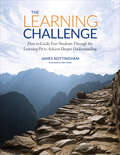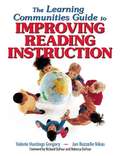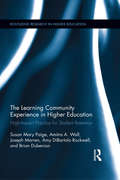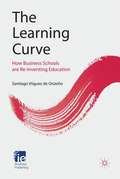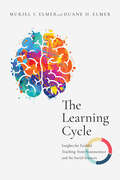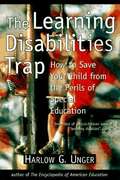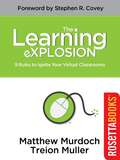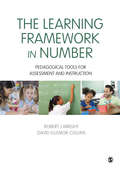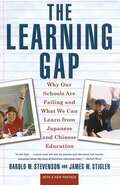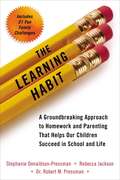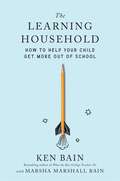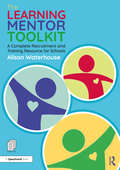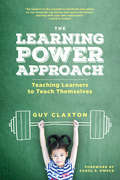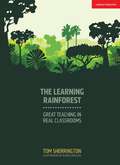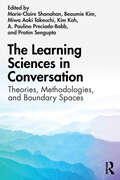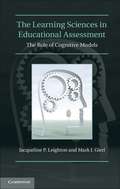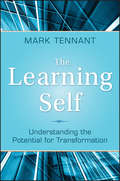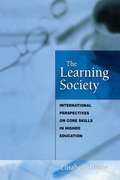- Table View
- List View
The Learning Challenge: How to Guide Your Students Through the Learning Pit to Achieve Deeper Understanding (Corwin Teaching Essentials)
by James A. NottinghamEmbrace challenge and celebrate Eureka! Challenge makes learning more interesting. That’s one of the reasons to encourage your students to dive into the learning pit—a state of cognitive conflict that forces students to think more deeply, critically, and strategically until they discover their “eureka” moment. Nottingham, an internationally known author and consultant, will show you how to promote challenge, dialogue, and a growth mindset through: Practical strategies that guide students through the four stages of the Learning Challenge Engaging lesson plan ideas and classroom activities Inspiring examples from Learning Challenges across the world
The Learning Communities Guide to Improving Reading Instruction
by Valerie Hastings Gregory Jan Rozzelle NikasThe themes of attending to individual needs, providing assessment-driven instruction, and creating long-term, focused professional development plans are solid and consistent throughout.
The Learning Community Experience in Higher Education: High-Impact Practice for Student Retention (Routledge Research in Higher Education)
by Susan Mary Paige Amitra A Wall Joseph J Marren Brian Dubenion Amy RockwellOffering an interdisciplinary qualitative approach, this book examines and evaluates the role and benefits of a Learning Community (LC), a high-impact practice for student retention in higher education. Grounded in in-depth case studies and first-person student experiences, the authors studied four student cohorts (sophomore, junior, senior, and graduate students) who participated in a full immersion LC experience at an urban public four-year college in New York. Focusing on the maturity students develop as they progress toward their degrees, the authors evaluate the impact of the learning community on the students’ experiences, perceptions, successes and obstacles. A powerful demonstration of the effects of connection and comradery on learning, this account explores how the LC helps the decision-making of those in higher education administration regarding high impact student interventions.
The Learning Curve
by Santiago Iniguez de OnzonoHow do you create world-class educational institutions that are academically rigorous and vocationally relevant? Are business schools the blueprint for institutions of the future, oran educational experiment gone wrong? This is thefirst title in a new series from IE Business School, IE Business Publishing .
The Learning Cycle: Insights for Faithful Teaching from Neuroscience and the Social Sciences
by Duane H. Elmer Muriel I. ElmerHow teachers teach is not necessarily how learners learn.
The Learning Disabilities Trap: How to Save Your Child From the Perils of Special Education
by Harlow G. UngerWhy do educators seek to label more than one-third of our nation's schoolchildren as "learning disabled" when clearly they are not? This practical, easy-to-use book answers that question and shows parents of school-age children how to distinguish between normal learning differences and true learning disabilities; how to have your child properly evaluated at the first sign of a learning difficulty; how to help your child convert learning differences into learning advantages; how to select the right school or program for your child; and how to stimulate your child's intellectual development from infancy onward to enhance progress in school. This book shows parents how to give their children the learning tools and support they need. It also includes core curriculum milestones by which parents can evaluate their children's progress and lists of organizations and schools that can help.
The Learning Explosion
by Treion Muller Matthew MurdochMaking the move to online teaching and learning can be challenging, and professionals and laypeople alike want to know the best ways to accomplish the switchover without sacrificing the quality of the material that is being taught. The ultimate challenge is how one transfers the in-person teaching experience and to retain the quality of that experience in the online world in a way that maintains its original integrity. Ultimately what we want is an experience that is challenging and just as engaging as the experience one would get in a live classroom. This book helps readers learn how to transfer their in-person classroom experience and skills to the virtual classroom.
The Learning Framework in Number: Pedagogical Tools for Assessment and Instruction (Math Recovery)
by Robert J Wright David Ellemor-CollinsThis book is borne out of a collaborative research project (2004-8) between Math Recovery and CEM (Catholic Education Melbourne) funded by the Australian Research Council focusing on intervention in the number learning of low-attaining students in the first five years of school. This has involved developing new pedagogical tools (PTs) for assessment, instruction and intervention including a coherent, research-based framework for understanding the key aspects of students’ developing number knowledge. It also offers guidance on innovative video-based assessment and an overview of principles of intervention instruction. This book will be a useful guide for all primary and elementary school classroom teachers and assistants, and specialist teachers, including experienced Mathematics Recovery instructors. It will also be of significant interest to teacher educators and researchers.
The Learning Framework in Number: Pedagogical Tools for Assessment and Instruction (Math Recovery)
by Robert J Wright David Ellemor-CollinsThis book is borne out of a collaborative research project (2004-8) between Math Recovery and CEM (Catholic Education Melbourne) funded by the Australian Research Council focusing on intervention in the number learning of low-attaining students in the first five years of school. This has involved developing new pedagogical tools (PTs) for assessment, instruction and intervention including a coherent, research-based framework for understanding the key aspects of students’ developing number knowledge. It also offers guidance on innovative video-based assessment and an overview of principles of intervention instruction. This book will be a useful guide for all primary and elementary school classroom teachers and assistants, and specialist teachers, including experienced Mathematics Recovery instructors. It will also be of significant interest to teacher educators and researchers.
The Learning Gap: Why Our Schools Are Failing and What We Can Learn from Japanese and Chinese Education
by Harold W. Stevenson and James W. StiglerFrom Simon & Schuster, The Learning Gap explores why our schools are failing and what we can learn from Japanese and Chinese education. Authors Harold W. Stevenson and James W. Stigler compare United States elementary education practices with those in Asia (specifically Japan and China) and comes to some surprising conclusions.
The Learning Habit: A Groundbreaking Approach to Homework and Parenting that Helps Our Children Succeed in School and Life
by Rebecca Jackson Dr Robert Pressman Stephanie Donaldson-PressmanA groundbreaking approach to building learning habits for life, based on a major new study revealing what works - and what doesn't Life is different for kids today. Between standardized testing, the Common Core Curriculum, copious homework assignments, and seemingly endless amounts of "screen time," it's hard for kids - and parents - to know what's most essential. How can parents help their kids succeed - not just do well "on the test" -- but develop the learning habits they'll need to thrive throughout their lives?This important and parent-friendly book presents new solutions based on the largest study of family routines ever conducted. The Learning Habit offers a blueprint for navigating the maze of homework, media use, and the everyday stress that families with school-age children face; turning those "stress times" into opportunities to develop the eight critical skills kids will need to succeed in college and in the highly competitive job market of tomorrow - skills including concentration and focus, time management, decision-making, goal-setting, and self-reliance. Along with hands-on advice and compelling real-life case studies, the book includes 21 fun family challenges for parents and kids, bringing together the latest research with simple everyday solutions to help kids thrive, academically and beyond.
The Learning Household: How to Help Your Child Get More out of School
by Ken BainAn expert guide to raising creative, passionate learners, from the bestselling author of What the Best College Teachers Do.Children are eager learners. As anyone who has taken a car trip with a toddler will tell you, they have a seemingly endless urge to ask questions about whatever pops into their heads. And yet, many kids end up bored and alienated at school. What can parents do to sustain their natural curiosity?In The Learning Household, educators Ken Bain and Marsha Marshall Bain argue that parents can do a lot. Too often, however, parents emphasize grades instead of instilling the creativity, grit, and enthusiasm necessary to navigate a rapidly changing world. At its best, school provides opportunities to cultivate innovation and apply knowledge to novel problems. But before children can experience such an education, parents must create “a learning household” in which they encourage children to ask thoughtful questions rather than memorize correct answers, to discover their passions rather than fret about report cards, and to take risks rather than worry about failing.Providing dozens of activities that can be adapted to meet the needs of every family, The Learning Household is an essential guide to bringing curiosity back to the classroom and fostering an appreciation for the intrinsic value of learning.
The Learning Mentor Manual
by Stephanie GeorgeAre you looking for ideas, advice and guidance to make you an effective Learning Mentor? This practical book is designed to help those new to the Learning Mentor role avoid common pitfalls, and to help those with more experience to develop their skills. Written by an expert practitioner, the book includes: - step-by-step advice on how to be a good Learning Mentor - guidance on working with school management teams, teachers and parents - advice on how to provide effective student support - case studies to illustrate best practice - suggested strategies for monitoring and evaluating interventions - templates to use and adapt - substantial electronic resource materials available from the SAGE website to use with the book. An inspiring read for all primary and secondary Learning Mentors and trainee Learning Mentors, this book is relevant to anyone involved with student support and pastoral care. Stephanie George is a teacher and manager of the Learning Support Unit at Plashet School, East London where she is responsible for the training of learning mentors.
The Learning Mentor Toolkit: A Complete Recruitment and Training Resource for Schools
by Alison WaterhouseThe Learning Mentor Toolkit provides all of the resources necessary to recruit, train and supervise adult learning mentors looking to support children and young people within the school environment. Packed full of information, this book details all of the necessary training and uncovers how best to ensure that supervision meets the needs of the volunteers, the children and the school. Developed to enable a lead member of staff to find, co-create and train a range of adults from the school community and use these Volunteer Learning Mentors to support children and young people within their environment, the support offered is linked to the five key areas that create positive foundations for mental health and wellbeing: • the ability to create and develop positive relationships • emotional literacy • self-awareness • how our brains can affect learning and behaviour • skills for learning Full of practical advice and resources, this book is the ideal resource for any wellbeing lead or senior leadership team looking to recruit and train learning mentors within their school.
The Learning Power Approach: Teaching Learners to Teach Themselves (Corwin Teaching Essentials)
by Guy ClaxtonBecome mind-fit for life! Learning is learnable! Educators can explicitly teach not just content, knowledge and skills, but also positive learning attitudes and habits of mind. Guy Claxton’s The Learning Power Approach will help teachers understand how ‘every lesson, every day’ shapes the way students see themselves as learners. This is the beauty of the Learning Power Approach: it is something all teachers can integrate into their daily practice. Claxton’s work helps us notice ‘what lies beneath’ the surface of our teaching and attend more closely to the way we shape dispositions and attitudes. Readers will find: • approaches focused on building character alongside knowledge acquisition • cognitive, social and neuroscientific supportive evidence • practical illustrations and strategies Written by a renowned cognitive scientist, this book offers a ground-breaking set of design principles for strengthening students’ learning muscles. "This is the beauty of the Learning Power Approach. It is not a program, not a subject, not an add-on - it is something all teachers can integrate into their practice on a daily basis. Claxton’s work helps us notice ‘what lies beneath’ the surface of our teaching and to attend much more closely to the way we shape dispositions and attitudes to learning." Kath Murdoch, Education Consultant University of Melbourne, Melbourne, Australia
The Learning Power Approach: Teaching Learners to Teach Themselves (Corwin Teaching Essentials)
by Guy ClaxtonBecome mind-fit for life! Learning is learnable! Educators can explicitly teach not just content, knowledge and skills, but also positive learning attitudes and habits of mind. Guy Claxton’s The Learning Power Approach will help teachers understand how ‘every lesson, every day’ shapes the way students see themselves as learners. This is the beauty of the Learning Power Approach: it is something all teachers can integrate into their daily practice. Claxton’s work helps us notice ‘what lies beneath’ the surface of our teaching and attend more closely to the way we shape dispositions and attitudes. Readers will find: • approaches focused on building character alongside knowledge acquisition • cognitive, social and neuroscientific supportive evidence • practical illustrations and strategies Written by a renowned cognitive scientist, this book offers a ground-breaking set of design principles for strengthening students’ learning muscles. "This is the beauty of the Learning Power Approach. It is not a program, not a subject, not an add-on - it is something all teachers can integrate into their practice on a daily basis. Claxton’s work helps us notice ‘what lies beneath’ the surface of our teaching and to attend much more closely to the way we shape dispositions and attitudes to learning." Kath Murdoch, Education Consultant University of Melbourne, Melbourne, Australia
The Learning Rainforest Fieldbook
by Tom SherringtonTom Sherrington's 2017 book The Learning Rainforest won rave reviews for its brilliant weaving of research evidence into a powerful vision of how education can transform lives, even in the most challenging settings. In this follow-up book, Tom explores how these ideas take shape in the real world of education, referencing the journeys that a range of schools and colleges have been on in recent years.
The Learning Rainforest Fieldbook
by Tom SherringtonTom Sherrington's 2017 book The Learning Rainforest won rave reviews for its brilliant weaving of research evidence into a powerful vision of how education can transform lives, even in the most challenging settings. In this follow-up book, Tom explores how these ideas take shape in the real world of education, referencing the journeys that a range of schools and colleges have been on in recent years.
The Learning Rainforest: Great Teaching in Real Classrooms
by Tom SherringtonThe Learning Rainforest is an attempt to capture various different elements of our understanding and experience of teaching. It is a celebration of great teaching - the joy of it and the intellectual and personal rewards that teaching brings. It is aimed at teachers of all kinds; busy people working in complex environments with little time to spare. The core of the book is a guide to making teaching both effective and manageable; it provides an accessible summary of key contemporary evidence-based ideas about teaching and learning and the debates that all teachers should be engaging in. It's a book packed with strategies for making great teaching attainable in the context of real schools. The Learning Rainforest metaphor is an attempt to capture various different elements of our understanding and experience of teaching. Tom's ideas about what constitutes great teaching are drawn from his experiences as a teacher and a school leader over the last 30 years, alongside everything he has read and all the debates he's engaged with during that time. An underlying theme of this book is that a career in teaching is a process of continual personal development and professional learning as is engaging in fundamental debates rage on about the kind of education we value. As you meet each new class and move from school to school, your perspectives shift; your sense of what seems to work adjusts to each new context. In writing this book, Tom is trying to capture some of the journey he's been on. He has learned that it is ok to change your mind. More than that - sometimes it is simply necessary to get your head out of the sand, to change direction; to admit your mistakes.
The Learning Rainforest: Great Teaching in Real Classrooms
by Tom SherringtonThe Learning Rainforest is an attempt to capture various different elements of our understanding and experience of teaching. It is a celebration of great teaching - the joy of it and the intellectual and personal rewards that teaching brings. It is aimed at teachers of all kinds; busy people working in complex environments with little time to spare. The core of the book is a guide to making teaching both effective and manageable; it provides an accessible summary of key contemporary evidence-based ideas about teaching and learning and the debates that all teachers should be engaging in. It's a book packed with strategies for making great teaching attainable in the context of real schools. The Learning Rainforest metaphor is an attempt to capture various different elements of our understanding and experience of teaching. Tom's ideas about what constitutes great teaching are drawn from his experiences as a teacher and a school leader over the last 30 years, alongside everything he has read and all the debates he's engaged with during that time. An underlying theme of this book is that a career in teaching is a process of continual personal development and professional learning as is engaging in fundamental debates rage on about the kind of education we value. As you meet each new class and move from school to school, your perspectives shift; your sense of what seems to work adjusts to each new context. In writing this book, Tom is trying to capture some of the journey he's been on. He has learned that it is ok to change your mind. More than that - sometimes it is simply necessary to get your head out of the sand, to change direction; to admit your mistakes.
The Learning Sciences in Conversation: Theories, Methodologies, and Boundary Spaces
by Pratim Sengupta Marie-Claire Shanahan Beaumie Kim Miwa Aoki Takeuchi Kim Koh A. Paulino Preciado-BabbThe Learning Sciences in Conversation explores the unique pluralities, complex networks, and distinct approaches of the learning scientists of today. Focused on four key scholarly areas – transdisciplinarity, design, cognition, and technology – this cutting-edge volume draws on empirical and theoretical foundations to illustrate the directions, perspectives, methods, and questions that continue to define this evolving field. Contributions by researchers are put in dialogue with one another, offering an exemplary analysis of a field that synthesizes, in situ, various scholarly traditions and orientations to create a critical and heterogenous understanding of learning.
The Learning Sciences in Conversation: Theories, Methodologies, and Boundary Spaces
by Pratim Sengupta Marie-Claire Shanahan Beaumie Kim Miwa Aoki Takeuchi Kim Koh A. Paulino Preciado-BabbThe Learning Sciences in Conversation explores the unique pluralities, complex networks, and distinct approaches of the learning scientists of today. Focused on four key scholarly areas – transdisciplinarity, design, cognition, and technology – this cutting-edge volume draws on empirical and theoretical foundations to illustrate the directions, perspectives, methods, and questions that continue to define this evolving field. Contributions by researchers are put in dialogue with one another, offering an exemplary analysis of a field that synthesizes, in situ, various scholarly traditions and orientations to create a critical and heterogenous understanding of learning.
The Learning Sciences in Educational Assessment
by Mark J. Gierl Jacqueline P. LeightonThere is mounting hope in the United States that federal legislation in the form of No Child Left Behind will improve educational outcomes. As titanic as the challenge appears to be, however, the solution could be at our fingertips. This volume identifies visual types of cognitive models in reading, science and mathematics for researchers, test developers, school administrators, policy makers and teachers. In the process of identifying these cognitive models, the book also explores methodological or translation issues to consider as decisions are made about how to generate psychologically informative and psychometrically viable large-scale assessments based on the learning sciences. Initiatives to overhaul educational systems in disrepair may begin with national policies, but the success of these policies will hinge on how well stakeholders begin to rethink what is possible with a keystone of the educational system: large-scale assessment.
The Learning Self
by Mark TennantThis new book from the award-winning author of Psychology and Adult Learning puts the spotlight on the kind of learning that brings about significant personal change. Tennant explores the techniques, processes, and practices educators can use to promote learning that leads to change and examines assumptions about self and identity, how we are formed, and our capacity for change. Throughout the book, Tennant posits that individuals can be agents in their own self-formation and change by understanding and acting on the circumstances and forces that surround and shape them. Educators, he argues, must be open to different theoretical ideas and practices while simultaneously valuing these practices and viewing them with a critical eye. The book aims to: promote, among educators and others with an educational dimension to their work, a more critical approach to their learning designs and practices; equip individuals with a framework for understanding and being agents of their own self-formation and change.
The Learning Society: International Perspectives on Core Skills in Higher Education
by Elisabeth DunneThis text provides perspectives in British and international interpretations of a learning society and what the roles of core skills are. The book covers what should be happening in theory and what is happening in practice and develops a critical awareness of the issues.
